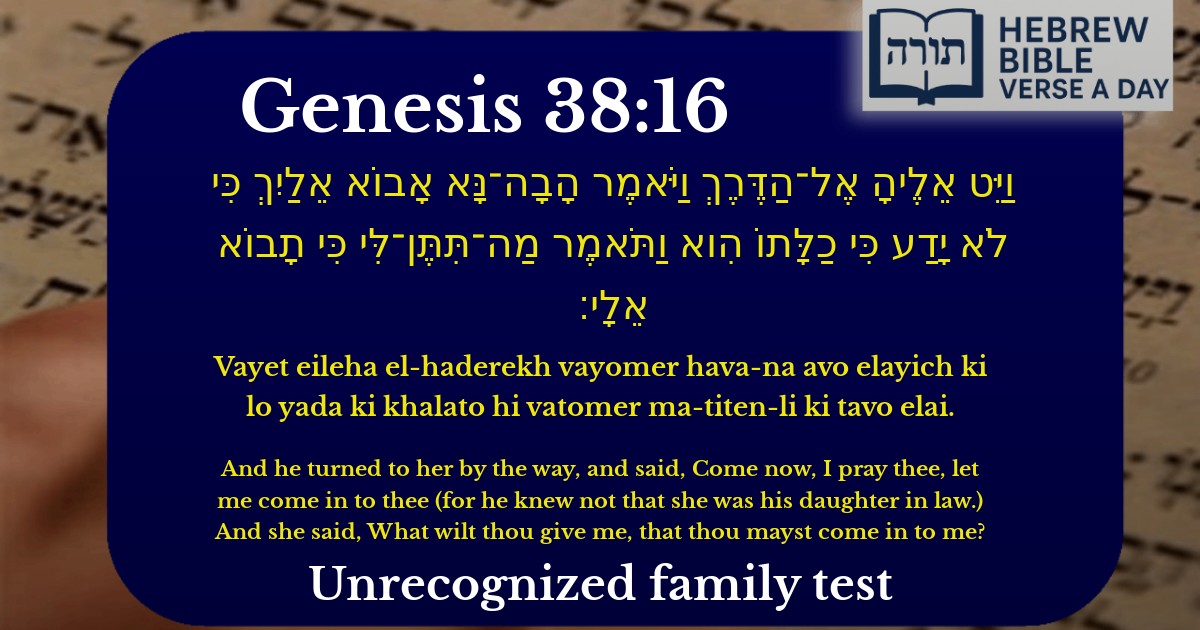Join Our Newsletter To Be Informed When New Videos Are Posted
Join the thousands of fellow Studends who rely on our videos to learn how to read the bible in Hebrew for free!
Hebrew Text
וַיֵּט אֵלֶיהָ אֶל־הַדֶּרֶךְ וַיֹּאמֶר הָבָה־נָּא אָבוֹא אֵלַיִךְ כִּי לֹא יָדַע כִּי כַלָּתוֹ הִוא וַתֹּאמֶר מַה־תִּתֶּן־לִּי כִּי תָבוֹא אֵלָי׃
English Translation
And he turned to her by the way, and said, Come now, I pray thee, let me come in to thee (for he knew not that she was his daughter in law.) And she said, What wilt thou give me, that thou mayst come in to me?
Transliteration
Vayet eileha el-haderekh vayomer hava-na avo elayich ki lo yada ki khalato hi vatomer ma-titen-li ki tavo elai.
Hebrew Leining Text
וַיֵּ֨ט אֵלֶ֜יהָ אֶל־הַדֶּ֗רֶךְ וַיֹּ֙אמֶר֙ הָֽבָה־נָּא֙ אָב֣וֹא אֵלַ֔יִךְ כִּ֚י לֹ֣א יָדַ֔ע כִּ֥י כַלָּת֖וֹ הִ֑וא וַתֹּ֙אמֶר֙ מַה־תִּתֶּן־לִ֔י כִּ֥י תָב֖וֹא אֵלָֽי׃
וַיֵּ֨ט אֵלֶ֜יהָ אֶל־הַדֶּ֗רֶךְ וַיֹּ֙אמֶר֙ הָֽבָה־נָּא֙ אָב֣וֹא אֵלַ֔יִךְ כִּ֚י לֹ֣א יָדַ֔ע כִּ֥י כַלָּת֖וֹ הִ֑וא וַתֹּ֙אמֶר֙ מַה־תִּתֶּן־לִ֔י כִּ֥י תָב֖וֹא אֵלָֽי׃
🎵 Listen to leining
Parasha Commentary
📚 Talmud Citations
This verse is not quoted in the Talmud.


Context and Background
The verse (Bereishit 38:16) describes the encounter between Yehuda and Tamar, where Yehuda, not recognizing Tamar as his daughter-in-law, propositions her. This episode occurs after Tamar was widowed twice (from Yehuda's sons, Er and Onan) and Yehuda failed to fulfill his obligation of yibbum (levirate marriage) by withholding his third son, Shelah.
Yehuda's Mistaken Identity
Rashi explains that Yehuda did not recognize Tamar because she had covered her face while living in her father's house, adhering to modesty (tzniut). The Midrash (Bereishit Rabbah 85:8) adds that Yehuda was led to this encounter as part of Divine Providence to rectify his earlier failure in withholding Shelah.
Tamar's Response
Tamar's reply, "What will you give me?" is interpreted by the Talmud (Sotah 10a) as a test of Yehuda's integrity. Rather than immediately revealing her identity, she sought to ensure Yehuda would uphold his word, as seen when she later demanded his pledge (signet, cord, and staff). The Midrash (Bereishit Rabbah 85:9) praises Tamar's wisdom in securing evidence to protect her righteousness.
Moral and Halachic Implications
Lessons for Today
The Maharal (Gur Aryeh) highlights the importance of taking responsibility for one's actions, as Yehuda later admits, "She is more righteous than I" (Bereishit 38:26). This episode underscores the Torah's emphasis on truth, repentance, and the hidden ways of Divine justice.